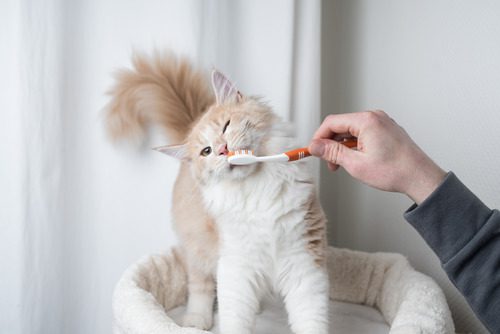Proper dental care is essential for the overall health of cats and dogs. Maintaining their dental hygiene helps prevent issues like bad breath, tooth loss, and serious infections that can affect their general health. Pet owners often wonder, “How often should cats and dogs get their teeth cleaned?” Understanding the importance of regular dental check-ups and cleanings is vital to keep your pets healthy and happy. At Southeast Oakville Veterinary Hospital in Oakville, ON, we prioritize your pet’s well-being by providing comprehensive dental care services.

The Importance of Regular Dental Care
Regular dental care is crucial for your pet’s health. Just like humans, pets need consistent dental hygiene to prevent plaque buildup, tartar formation, and periodontal disease. Periodontal disease is common in pets and can lead to severe health issues if not addressed promptly. These problems can include pain, difficulty eating, and even systemic infections that impact vital organs.
Signs of Dental Issues in Pets
Recognizing the signs of dental problems early can help you seek timely veterinary care. Look out for symptoms like:
- Bad breath
- Red or swollen gums
- Yellow or brown tartar buildup
- Difficulty eating or loss of appetite
- Pawing at the mouth or face
- Drooling excessively
If you notice any of these signs, schedule a dental check-up for your pet. Early intervention can prevent more severe health problems.
How Often Should Dogs and Cats Get Their Teeth Cleaned?
Dogs and cats require regular dental cleanings to maintain optimal oral health. Cats are particularly adept at hiding signs of discomfort, making it even more crucial to maintain regular dental check-ups. The frequency of dental cleanings depends on several factors, including age, breed, and individual health needs.
Factors Influencing Dental Cleaning Frequency
- Age: Puppies and kittens typically have cleaner teeth than older pets, but dental care should start early. As your pet ages, their risk of dental disease increases, necessitating more frequent cleanings.
- Breed: Some dog and cat breeds are more prone to dental issues. Small dog breeds like Chihuahuas and Dachshunds or Persians and Siamese cats often require more frequent cleanings due to their predisposition to dental problems.
- Diet and Home Care: Dogs and cats that eat a balanced diet and receive regular home dental care may need fewer professional cleanings. However, this does not replace the need for professional dental exams.
- Health Status: Pets with existing dental issues or other health conditions may need more frequent dental care to manage their overall health effectively.
What to Expect During a Dental Cleaning
Professional dental cleanings for pets involve several steps to ensure thorough care and address any dental issues.
Steps Involved in a Professional Dental Cleaning
- Pre-Anesthetic Exam: Before the dental cleaning, your veterinarian will perform a thorough physical exam to ensure your pet is healthy enough for anesthesia.
- Anesthesia: Dental cleanings require general anesthesia to ensure your pet remains still and comfortable during the procedure.
- Oral Examination: Once under anesthesia, the veterinarian will examine your pet’s mouth, teeth, and gums for signs of disease or other issues.
- Scaling and Polishing: The veterinarian will use specialized tools to remove plaque and tartar from your pet’s teeth, both above and below the gum line. After scaling, the teeth are polished to smooth the surface and prevent future plaque buildup.
- Dental X-Rays: In some cases, dental x-rays may be taken to assess the health of the tooth roots and jawbone.
- Extractions and Treatment: If necessary, the veterinarian may perform extractions or other treatments to address any dental issues.
Post-Cleaning Care
After the dental cleaning, your pet may need some time to recover from the anesthesia. Your veterinarian will provide post-operative care instructions, including feeding guidelines and any necessary medications. Regular follow-up appointments will help ensure your pet’s dental health remains in good condition.
Maintaining Your Pet’s Dental Health at Home
While professional cleanings are essential, maintaining your pet’s dental health at home is equally important.
- Regularly brushing your pet’s teeth is one of the most effective ways to prevent dental disease. Use a pet-specific toothbrush and toothpaste.
- Dental treats and chews can help reduce plaque and tartar buildup. Choose products approved by your veterinarian.
- Schedule regular dental check-ups with your veterinarian to monitor your pet’s dental health and address any issues early.
- A balanced diet supports overall health, including dental health. Discuss with your veterinarian the best dietary options for your pet’s dental needs.
Signs of Effective At-Home Care
Effective at-home dental care can significantly reduce the risk of dental disease in your pets. Signs that your efforts are working include fresh breath, clean teeth, and healthy gums. Regular professional cleanings combined with diligent at-home care can keep your pet’s mouth healthy and prevent serious health issues.
Contact Southeast Oakville Veterinary Hospital for Expert Dental Care
At Southeast Oakville Veterinary Hospital, we are dedicated to providing the best dental care for your pets. Our team of experienced veterinarians and staff is here to help you maintain your pet’s dental health through regular cleanings, exams, and at-home care guidance. Regular dental care is a vital part of their overall health, ensuring they live a happy and healthy life. Call Southeast Oakville Veterinary Hospital to schedule your pet’s dental check-up and cleaning.
Recent Posts
About Us
Southeast Oakville Vet offers a beautiful, state-of-the-art facility and is the only animal hospital in Canada that is AAHA accredited, Fear Free Practice Certified, and Cat-Friendly Practice Gold Certified. We continue to uphold these distinctions to support a lifetime of excellent health for your pets!
